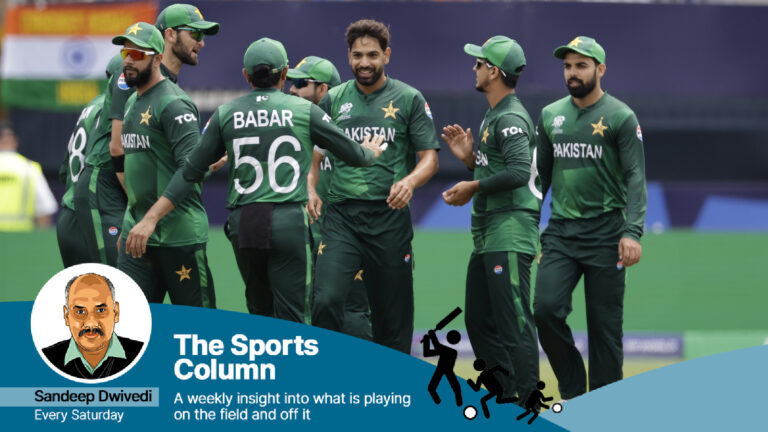He was once Pakistan cricket’s unknown Virat Kohli. Now, at 32, Ahmed Shehzad is a rangy, acerbic TV pundit. He has a strong stage presence and a theatrical delivery. Film critics would add that he overacts. Pakistan’s losses to the USA and India in the T20 World Cup made his “overacting” obvious.
He cites a piece of paper with numbers on it to attack notorious captain Babar Azam: “In big tournaments, he averages 27 with a strike rate of 112. He’s third in the world for runs scored in defeats – 1,400,” he says, raising his voice, before scornfully tossing the piece of paper with Babar’s dismal numbers into the air.
The show wasn’t over yet. He finished his lengthy rant by glaring angrily at the fallen chit on the ground.Kaunsa King Babar is… “What good is a king if he ain’t got no points?” The monologue captivated the studio audience. They rose to their feet and applauded. If this had been a movie theater, they would have showered coins on him.

He is not the only Pakistani cricket commentator on television and social media who is at risk of having a ruptured nerve or a clogged artery by the end of this ICC event. Emotions are running higher than ever and voices are being raised regularly.
Basit Ali, who was dubbed “the next Javed Miandoo” in the early ’90s, is raging on his YouTube channel after the Pakistan vs India fiasco. He claims to be unwell, but that doesn’t stop him from calling Mohammed Rizwan “third-rate.” He makes the kind of cooing noises parents use to get their toddler’s attention and talks about how India has treated Pakistan like idiots. He also makes some casteist comments that aren’t worth repeating here.
Surprisingly, he’s not the worst. Self-proclaimed YouTubers and journalists, some operating from their bedroom desktops with children’s cheering in the background and others with neem trees swaying on their balconies, use far more foul language. On one such channel, Babar goes by the untranslatable pseudonym Gante Ka King.
Welcome to Pakistan’s anything-goes, no-holds-barred new media. Sociologists would see this as the anger of a failed nation struggling to come to terms with losing in cricket, a reliable pastime that has always given it pride and joy. But there is more to it than meets the eye of an armchair psychoanalyst.

In a world ruled by clicks, viewership and pageviews, Outrage, Inc. has emerged as a highly successful business model. The lynch mob response to sports slump is the guiding principle of these companies. It is a versatile tool in their toolbox. The spark to the raging fire happens to be their employee KRA. Pakistani fans with a penchant for smashing TV sets after a loss are their trusted customers. They are the voice of the crazed, loud cricket fans, of which there are many these days.

Recently, these Nafrat ki Dukaan‘ — a reversal of a phrase commonly heard during India’s elections — has attracted thousands of new subscribers from India. Who can resist peering behind the curtain at a bitter quarrel between neighbouring families? The comment sections of these sharp-tongued shows show how India has succumbed to the second-hand pleasure of watching the plight of its arch enemy from a safe distance.
But the house never loses. It is Indian interest that makes Pakistani broadcasters win the battle for likes, shares and subscriptions. Their cricketers may be losing, but their YouTubers are winning. Catering to the demands of new customers from the other side of the fence, Pakistani shows are friendly to Indian cricketers. Rohit Sharma and co. do not suffer the same harmful scrutiny that Babar and co. are subjected to. So what did they say about Rohit and Virat Kohli not scoring in the first two matches of this T20 World Cup? “They don’t believe in scoring against weaker teams. They will score later in the tournament,” says a YouTuber from the show.
Also speaking from the US was Pakistan cricket high priest Wasim Akram, who wants the whole team to come home, and who mocked Iftikhar Ahmed’s inability to score leg-side shots.Abe Pundla took the ball he hit off the stumps and saw him staring at his back.“…(Hey, you’ve been playing for 15 years, try and hit a few off-side strokes),” he says. Mohammed Rizwan has been criticised for his shot selection and Babar for his captaincy.
Akram is furious. He knows he may end up saying something he shouldn’t. He says he doesn’t care if what he says goes viral, and continues his denunciations: “They don’t talk to each other, they don’t get along. It’s a disgrace. Enough is enough. They have to go.”
Perhaps so, but Akram played cricket during the match-fixing scandals of the 90s, the most shocking and shameful period for Pakistani cricket. He led a Pakistan team where communication broke down. Babar’s team was a disappointment, but Pakistan’s toxic anger was an unwanted overreaction. Akram says he doesn’t care if his comments go viral, but for Outrage Inc., it’s all about that.
Please send your feedback to sandydwivedi@gmail.com

